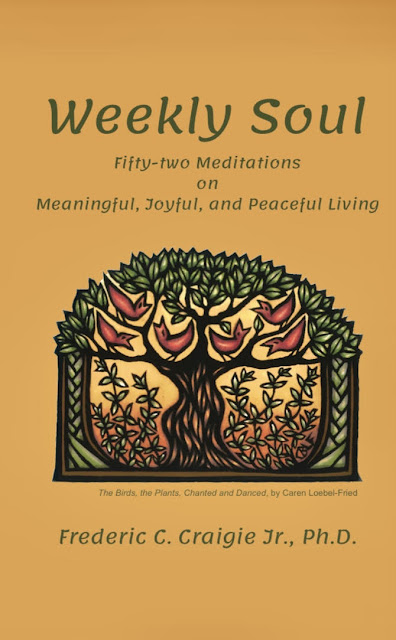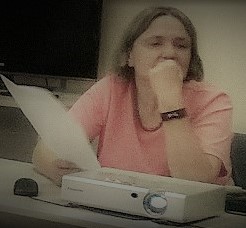Weekly Soul. Week 5 - Aliveness
Today's meditation from Weekly Soul: Fifty-two Meditations on Meaningful, Joyful, and Peaceful Living by Dr. Frederic Craigie.
-5-
Don’t ask what the
world needs; ask what makes you come alive, and go do it. Because what the
world needs is people who have come alive.
-
Howard
Thurman
Several years ago, I was in Chicago for a
professional conference. Life-long baseball player, fan, and addict that I am,
I never pass up an opportunity to see a major league game on the road. I took
the Red Line to the Sox-35th Avenue stop for U. S. Cellular Field
(where the White Sox play; it will always be “Comisky Park” to me) and got off
with the crowd.
On the platform was a small, thin, elderly
man with Chinese features, playing a two-stringed fiddle (which I later learned
is called an erhu) with the accompaniment of a small CD player. The music had a
beat to it and was really moving along. His eyes were closed, as in reverie,
and he had a smile on his lips.
Facing him was a young African American
woman dancing to the music. Enthralled, arms and legs flowing with the music,
her face an image of delight. It was clear to me that they hadn’t come together
as an act; it was more that they were drawn together—crossing divides of age
and culture—by the energy of the music. The crowd mostly shuffled past, heading
to the game. A few people paused. I was captivated by how alive they both were
in that special moment together.
Most of us want to save the world. Sometimes,
we aim to change the world through social and community activism—volunteering
at the food bank, serving on a nonprofit board, marching for a cause, teaching
English to refugees. Sometimes, we find life and aliveness in ventures like
these.
But do we not also bring a little goodness
into the world just by the very experience of being fully alive? The musicians
at the subway stop were not, I assume, driven by an assessment of “what the
world needs.” They were immersed in their passions for music—alive to their
passions for music—and the energy of that moment touched the heart, at least,
of a middle-aged psychologist walking by.
There are four reasons to cultivate and
give expression to “what makes you come alive.”
·
It’s
good for your soul, and probably, for your body. You add to your ledger of
resilience and wholeness with an accumulation of moments when you are
enthralled with your life.
·
Aliveness
creates energy that ripples out into the world. You know this; you have felt
touched in the same way that I have when you have been in the presence of
someone who was fully alive.
·
Your
particular contributions to the world—your vocation, your career, how you
choose to spend your time—will be more genuine and impactful if they “make you
come alive.” I have worked with physicians and other health care providers
whose hearts were not in their work, and I have known others who clearly found
deep delight and joy in their work even amid the daily frustrations and
challenges that we all face. I can tell you whom I will seek out for care when
the need comes.
·
What
are you doing with your life, anyway, if not to live in full and vital ways?
If you do noble things to save the world
that are outside the circle of your heart, it draws the life out of you and
doesn’t really change anything. If you nurture the things that make you come
alive, you are indeed addressing what the world needs.
Alas, the game, by the way, was rained
out.
Reflection
- Think of a time when you have
felt fully alive. Recall a story.
- When have you become so
engaged with something that you have lost track of time?
- The flip side… when have you
felt spiritually and emotionally dead? What do you stand to learn from
this?
- How would you rate your
aliveness on a scale of 0-10? What might you do to move up one level?
Author
The Rev. Dr. Howard Thurman (1899-1981) was an African-American theologian, educator, writer and civil rights activist. Born into poverty, he was raised by a grandmother who was a former slave. He pursued an education at Morehouse College and Rochester Theological Seminary and subsequently served as a pastor, seminary professor and dean at Howard University, Founder (with the Fellowship of Reconciliation) of first racially integrated, intercultural church in the United States, the Church for the Fellowship of All Peoples in San Francisco, and then professor and dean and Boston University.
Thurman was at the forefront of social thought and issues of justice and reconciliation in the mid-twentieth century. He studied with the Quaker mystic Rufus Jones in the late twenties, and then, in 1935-36, participated in the first African-American Delegation of Friendship to India and adjoining countries. It was on this trip that Thurman and two colleagues met with Mohandas Gandhi, and were moved by Gandhi’s ideas about social change and inter-cultural understanding. Thurman’s writing, in turn, was strongly influential for Martin Luther King, Jr., and other leaders of the American civil rights movement.
For more posts by and about Fred and his book, click HERE.
To purchase copies of this book at 25% discount,
use code FF25 at MSI Press webstore.
Want to buy this book and not have to pay for it?
Ask your local library to purchase and shelve it.
VISIT OUR WEBSITE TO LEARN MORE ABOUT ALL OUR AUTHORS AND TITLES.
 |
Follow MSI Press on Twitter, Face Book, and Instagram.
Interested in publishing with MSI Press LLC?
Check out information on how to submit a proposal.
Planning on self-publishing and don't know where to start? Our author au pair services will mentor you through the process.
Want an author-signed copy of this book? Purchase the book at 25% discount (use coupon code FF25) and concurrently send a written request to orders@msipress.com.
Julia Aziz, signing her book, Lessons of Labor, at an event at Book People in Austin, Texas.
Want to communicate with one of our authors? You can! Find their contact information on our Authors' Pages.
Check out our rankings -- and more -- HERE.














Comments
Post a Comment